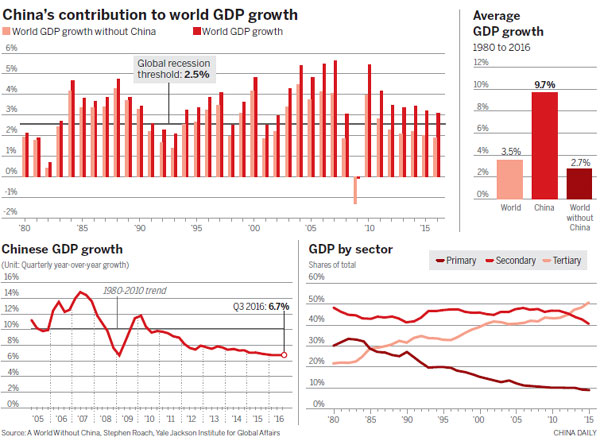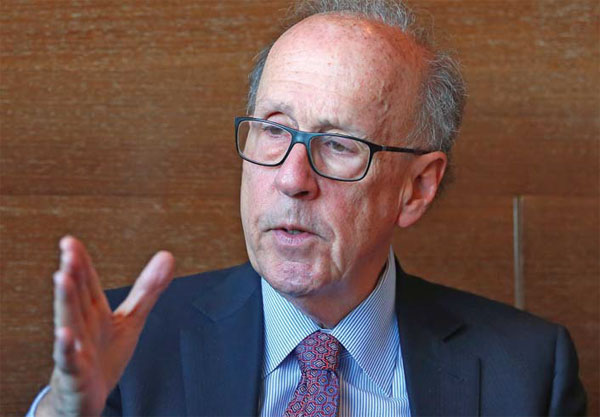There but for the presence of China ...

Expert lauds country's role as economic savior and as a guarantor of continued stability
The American economist Stephen Roach insists it is vital for the world economy that China continues to grow solidly in 2017.
The senior fellow at the Jackson Institute for Global Affairs at Yale University says that even with its "new normal" levels of growth its economy remains the engine of the world economy.
"If there is a dramatic slowdown in China there would be a period of weakness we have not seen at any period since the end of World War II," he warns.
Roach, also a former chairman of Morgan Stanley Asia, was speaking before giving a presentation on "A World Without China", looking at what would happen to the global economy without China's economic momentum, at a lunch organized by the Center for China and Globalization, a think tank in Beijing.
In the talk at the Park Hyatt Hotel in Beijing, he argues that world annual growth between 1980 and 2016 would have been just 2.7 percent - almost 25 percent less than its present 3.5 percent - without China growing at 9.7 percent during this period.
And that if China's growth was to fall from the 7.6 percent achieved in the first three quarters of 2016 to 5 percent next year, global growth would almost halve from 3.4 percent to 1.8 percent.
"Without China's growth the world will have fallen into a very deep recession after the global financial crisis, and that would apply now," Roach says.
He argues that since 1945 the world has had a major growth engine with the US powering the world economy in the 1950s, Europe growing strongly for much of the period and Japan and South Korea emerging before China.
"If China is not there, I don't think the US will provide it. I don't think Europe will or the rest of Asia or the resource economies will. The world will enter a period of significant weakness."
Roach says that among the worst hit will be the European economies such as Spain, Greece and Italy, which already have high levels of unemployment.
"There has been a lot of structural unemployment since the end of the financial crisis, and the hope has been that rising global growth would be able to absorb that. This, however, will not happen in a world without China."
Roach, who was brought up in Beverly Hills, California, began his career as a research fellow at the Brookings Institution in the 1970s after his doctorate at New York University.
He then went on to work for the Federal Reserve before joining Morgan Stanley in the 1980s.
He first got to know China well in the immediate aftermath of the Asian financial crisis in the late 1990s when he challenged himself to visit the country at least twice a month.
"For about five years I spent half my time there, and even now that I am teaching I still come four or five times a year."
Roach, who financially backed the Democratic presidential nominee Hillary Clinton in the recent election, is skeptical as to how Donald Trump as president can follow a fiscal expansion strategy while erecting trade barriers against China.
He argues that the US would only be able to fund the resultant increased budget deficit with Chinese savings. US savings are 2.3 percent of GDP compared with China's 40 percent.
"Fiscal expansion in a low-savings economy just spells bigger budget deficits and wider current account imbalances and trade deficits. This would put the US on a collision course with the protectionist policies that Mr Trump is also prescribing.
"Right now it is all blue sky and optimism (with the Dow Jones index hitting record highs in December) with little regard for some of the tougher issues which may be evident down the road."
Roach, also author of Unbalanced: The Codependency of America and China, fears the world situation is now worse than it was even in the inflationary era of the 1970s.
"It is hard to say from a geopolitical point of view but I think it is worse. You have the populist backlashes, the lack of appetite for trade liberalization and globalization.
"At the end of the 1970s we had high inflation, slowing growth, the specter of inflation but we worked our way through that by economic means rather than geostrategic cooperation."
Roach was encouraged by the Chinese government's Central Economic Work Conference in December, which placed emphasis again on achieving "new normal" medium to high growth and supply-side reforms.
"China's push toward supply-side reforms is welcome and important but it is not an excuse for not rebalancing the demand-side of the equation.
"What concerns me is that there is almost too much focus on the supply side without continuing to underscore the commitment toward consumer-led growth on the demand side. You need both supply and demand to drive China to the next phase and to avoid the middle-income trap."
Roach welcomes President Xi Jinping attending the World Economic Forum in Davos, Switzerland, next month and says it will be a chance for China to show leadership, if the West is seen to be retreating under Trump.
"They will want to hear that China is still committed to dealing with global issues from climate change to trade and also opening its markets and borders warmly to other nations."
He also believes much of the debate will be about the future of globalization, a concept almost led by China with its vital manufacturing role in global supply chains.
"Just where is globalization heading? There has been a lot of push-back against globalization; that is what Brexit was all about, that is what the ascendancy of Trump is all about and that is what potentially the election of Marine Le Pen in France is all about.
"These are some of the pressures that will be actively debated and discussed at Davos."
Roach argues, however, that as with 2016 there is still little sign of the world finally lifting itself from the global financial crisis.
"The theory of resilience of economic cycles is that economies in general are elastic organisms, so imagine holding a big rubber band. The further you pull it down, the faster it snaps back. We have had a very deep downturn but a very anemic snap back.
"There are still enormous headwinds in this post-crisis climate. If it had not been for China the world would be in a much weaker place."
andrewmoody@chinadaily.com.cn

| Stephen Roach, the senior fellow at the Jackson Institute for Global Affairs at Yale University, argues that world annual growth between 1980 and 2016 would have been just 2.7 percent - almost 25 percent less than its present 3.5 percent - without China growing at 9.7 percent during this period. Zou Hong / China Daily |
(China Daily European Weekly 12/30/2016 page5)
Today's Top News
- Xi calls for promoting volunteer spirit to serve national rejuvenation
- Xi chairs CPC meeting to review report on central discipline inspection
- Reunification will only make Taiwan better
- Outline of Xi's thought on strengthening military published
- Targeted action plan to unleash consumption momentum
- Separatist plans of Lai slammed































